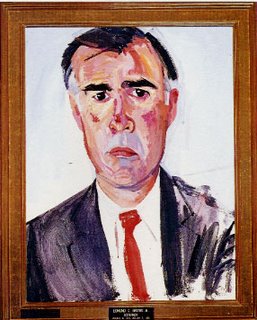 The chairmen of five county Republican committees have filed a lawsuit against five (generally heavily-Democratic) county registrars to prevent them from counting votes for Jerry Brown in his campaign for Attorney General. The theory is that Government Code § 12503 requires the Attorney General to have been able to practice before the California Supreme Court for at least five years prior to taking office:
The chairmen of five county Republican committees have filed a lawsuit against five (generally heavily-Democratic) county registrars to prevent them from counting votes for Jerry Brown in his campaign for Attorney General. The theory is that Government Code § 12503 requires the Attorney General to have been able to practice before the California Supreme Court for at least five years prior to taking office:
No person shall be eligible to the office of Attorney General unless he shall have been admitted to practice before the Supreme Court of the state for a period of at least five years immediately preceding his election or appointment to such office.
A search of the State Bar’s records for Jerry Brown shows that, indeed, he allowed his license to practice law to fall into inactive status from 1992 to 1996, and then again from 1997 to 2003. So he was rather clearly not an “active” member of the bar. Brown claims he let his membership lapse while he was Mayor of Oakland, but that doesn’t hold water — he was elected mayor in 1998, and had allowed his membership to lapse before that.
So the question is whether the phrase “admitted to practice before the Supreme Court” (from the statute) is the same thing as “able to practice before the Supreme Court” (which an inactive member cannot do). If these are the same thing, Brown is not qualified to be Attorney General. Allegedly, there is a 1980 opinion of then-Attorney General George Deukmejian, which included in dicta the statement that “inactive members are members of the bar.” If so, that would be strong authority that these two phrases are not the same thing, and that Brown’s admission to the Bar was always valid. I haven’t found that opinion in a quick search, but that doesn’t mean it doesn’t exist.
Regardless, the point seems fairly persuasive to me. Brown never stopped being a lawyer even if his license was inactive; he has over 40 years of experience as a lawyer, even if much of those 40 years was spent in politics rather than the practice. That doesn’t mean that I particularly want Moonbeam to be the state’s top lawyer, but he is legally qualified for the job.
Qualified or not, here’s what Section 12503 of the Government Code says:12503. No person shall be eligible to the office of AttorneyGeneral unless he shall have been admitted to practice before theSupreme Court of the state for a period of at least five yearsimmediately preceding his election or appointment to such office.California Supreme Court definition of ‘admitted to practice’ – The CA Supreme Court gave us a 2 part test: “It is self-evident, we think, that said provision requires as a fundamental qualification . . . that the candidate for such position [1] be qualified as an attorney [2] actually entitled to practice in the state courts” for the 5 years immediately preceding the election. Johnson v. State Bar of California (1937) 10 Cal.2d 212, 216. The Supreme Court has also said “An inactive member of the State Bar, of course, is not entitled to practice law.” Conway v. State Bar of California (1989) 47 Cal.3d 1101, 1111.Jerry Brown meets part [1] but was inactive 2 out of the last 5 years and therefore does not meet part [2].